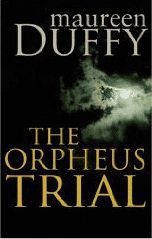Novels
The Orpheus Trail
When a child is found dead among the charred remains of a pier fire, surrounded by the old-fashioned toys of the Greek god Dionysus and a ritualistic fire basket, Detective Inspector Hildreth calls in the local museum’s curator, Alex Kish, to help him decipher the mysterious symbolism.
Soon afterwards an ancient Saxon amulet is stolen from the museum and the dead bodies of other young boys begin to turn up arranged as grotesque works of art with components of the gold amulet around their necks. The enigmatic Detective Inspector draws the curator into a strange web of ancient secrets, pagan ritualism, and the illegal trafficking of young boys.
Have the boys been murdered? How have they got there? What is the meaning of the symbols? And most of all who is responsible and why? The Orpheus Trail is a tense thriller where Hildreth and Kish are caught up in a race against time to interpret these ancient codes and clues before death claims another young life.
That’s How It Was (1962)
 ‘I was just a girl and life offered only things I despised: houses, children, security, housework. I had to pass. I had to. I had to be different.’
‘I was just a girl and life offered only things I despised: houses, children, security, housework. I had to pass. I had to. I had to be different.’
Paddy is illegitimate, the daughter of another Paddy — an active member of the IRA who abandons her English mother, Louey, at her birth. This is the story of that mother — frail, but with an indomitable spirit — of that daughter — and of their life together, seen through the clear eyes of Paddy as a child and adolescent. The working class life of wartime England is wonderfully evoked and the subtle changing relationship between Paddy and Louey is movingly conveyed.
The Single Eye (1964)
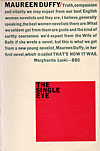 For Mike Fannon his profession is an art, his camera a trap to capture that sequence of moments which will add up to truth. By using this method, Maureen Duffy exhibits Mike’s life in a series of episodes, each trapped in a light as vivid and relentless as a flashbulb’s. The chances and frustrations of Mike’s life cut off and undermine ambition. Seeking in love, in marriage, the firm emotional base upon which he could live his life and pursue his art, he is twarted. Toni, his wife, is neither active helper nor passive audience; she becomes his rival. For her, art is something with which to decorate her character. The resulting tensions tear the marriage apart; in the bitterness that follows, Mike loses his way.
For Mike Fannon his profession is an art, his camera a trap to capture that sequence of moments which will add up to truth. By using this method, Maureen Duffy exhibits Mike’s life in a series of episodes, each trapped in a light as vivid and relentless as a flashbulb’s. The chances and frustrations of Mike’s life cut off and undermine ambition. Seeking in love, in marriage, the firm emotional base upon which he could live his life and pursue his art, he is twarted. Toni, his wife, is neither active helper nor passive audience; she becomes his rival. For her, art is something with which to decorate her character. The resulting tensions tear the marriage apart; in the bitterness that follows, Mike loses his way.
The Microcosm (1966)
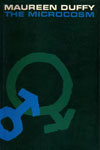 The main characters are all women and The Microcosm deals with their relationships, as they grow and as they disintegrate. The pressures of society force them to live in an enclosed world. Steve, the schooly under the strain of her marriage; Sadie’s factory environment brings its own financial and social problems; and Matt is unable to solve his difficulties with Rae until he breaks out of the microcosm.
The main characters are all women and The Microcosm deals with their relationships, as they grow and as they disintegrate. The pressures of society force them to live in an enclosed world. Steve, the schooly under the strain of her marriage; Sadie’s factory environment brings its own financial and social problems; and Matt is unable to solve his difficulties with Rae until he breaks out of the microcosm.
The Microcosm is at first presented in all it complexity, then certain elements are in their turn illuminated, until a possible solutions emerges for one of the characters. Not everyone will be able to accept the conclusions of this most subtle and original book. But they will be hard put to deny it forceful characterisation, its brilliantly accurate dialogue and its haunting evocation of a world within the world.
The Paradox Players (1967)
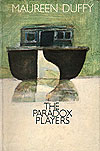 Set on the River Thames, near Hampton Court, her novel is concerned with Sym’s attempt to come to terms with himself after he has left his wife and family. A labourer by day and writer by night, he is drawn into the world of the river people. They are a race apart, and this perceptive novel tells of Sym’s involvement in their strange community beset by the seasons. He meets Walden, who represents for Sym the ultimate in the struggle of the individual against society, and Sassie, living apart from her husband. As winter tightens its grip on the river Sym becomes increasingly involved with her to the exclusion of everything else: extracts from his journal point to his anguish.
Set on the River Thames, near Hampton Court, her novel is concerned with Sym’s attempt to come to terms with himself after he has left his wife and family. A labourer by day and writer by night, he is drawn into the world of the river people. They are a race apart, and this perceptive novel tells of Sym’s involvement in their strange community beset by the seasons. He meets Walden, who represents for Sym the ultimate in the struggle of the individual against society, and Sassie, living apart from her husband. As winter tightens its grip on the river Sym becomes increasingly involved with her to the exclusion of everything else: extracts from his journal point to his anguish.
As the months cone and go from October to March the reader is totally drawn into this way of life, so different from the suburban world which its characters have rejected.
Wounds (1969)
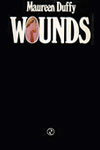 Wounds begins with two lovers in bed. Their lovemaking throughout the book forms a recurring leitmotif, a counterpoint to the examination of the spiritual death of the characters.
Wounds begins with two lovers in bed. Their lovemaking throughout the book forms a recurring leitmotif, a counterpoint to the examination of the spiritual death of the characters.
In a South London environment of pub and fairground, home and work, the wounds of 20th century experience are evoked in prose which is both lyrical and precise. Kingy in her garden, ‘loved by the most handsome women in the world’; Maura the barmaid: ‘I prefer the little, thin men'; Glisten the Mayor: ‘It’ll be take-over time and too late’ — these and the many other characters, both black and white, illustrate the basic theme of the novel.
Love Child (1971)
 ‘It was I who christened my mother’s lover.’
‘It was I who christened my mother’s lover.’
But did I kill Ajax? What am I anyway, monster or just a precocious child — as you were perhaps?’
This a novel of ambiguity: of age, sex and intention. On holiday in their villa in Italy, a love affair develops between the mother and the father's secretary. The child, with jealousy ferociously awakened, sets out to destroy the relationship with all the skill and concentration of a master spy.
I Want to Go to Moscow (1973) / All Heaven in a Rage (American Version)
 ’Do you know where Moscow is?
’Do you know where Moscow is?
Moscow is never.’
Our hero is Jarvis Chuff, hi-jacked from a life of crime into an even stranger life. He is guided by Philomela, sponsored by a group of, mainly, amiable eccentrics united by a common cause — a hatred of cruelty to animals and a determination to use unorthodox, criminal and even dangerous means to draw attention to the plight of the animals. So Chuff, like Candide before him, embarks with a sort of dumb wonder on a series of increasingly bizarre and socially disruptive adventures. Through a strong, swift and highly realistic story of movement which questions society’s assumptions, Maureen Duffy shows illuminating glimpses of the moral problems posed for society by its own outlaws and by its relations to animals of species other than the human.
Capital (1975)
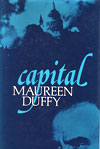 His porter’s uniform gave Meepers a passport to any part of the building at Queen's College, London, and he needed this freedom to reconnoitre and gather proofs for his research. At night he might creep out to a demolition site and rescue a shard of pottery before the huge teeth of earthmovers could destroy that delicate memory-bank.
His porter’s uniform gave Meepers a passport to any part of the building at Queen's College, London, and he needed this freedom to reconnoitre and gather proofs for his research. At night he might creep out to a demolition site and rescue a shard of pottery before the huge teeth of earthmovers could destroy that delicate memory-bank.
This shabby, homeless eccentric was committed to discovering the truth about civilisation — perhaps he would even be able to save the capital. He wanted to prove that Romano-British civilisation had held firm since its beginnings. The Dark Ages were emotively named: if there had never been a break in the continuity of civilised life, then, despite the physical desecration and spiritual decline that seem imminent, there is hope that civilisation will pass through this present age unmolested.
His quest leads him from the gardening hut where he sleeps, to Kensington Gardens, to the university, where he sits in on the lectures of a professor with whom he develops a curious, strained relationship, which gradually draws in other members of the class.
Housespy (1978)
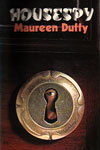 Scully was the housespy. At least that was what the Oldfields called him. But who was spying on whom? Scully, that most unusual of policemen; Reg Oldfield, Minister for Economic Planning; and Oldfield's American wife, Danny; these three were to be inseparable, because assassination or kidnapping were always on the cards. So Scully went to Paris, worried about the mysterious telephone calls, interested by the erratic behaviour of Danny Oldfield, not amused by the attempt to run him down. But Paris was only the first episode. Wherever Oldfield went — his constituency, Amsterdam, Munich — there was danger, for him and for Scully, a danger which was sometimes violent in its effect, but often insubstantial and menacing. It was not until Scully flew to America that a pattern — a very strange pattern — began to emerge.
Scully was the housespy. At least that was what the Oldfields called him. But who was spying on whom? Scully, that most unusual of policemen; Reg Oldfield, Minister for Economic Planning; and Oldfield's American wife, Danny; these three were to be inseparable, because assassination or kidnapping were always on the cards. So Scully went to Paris, worried about the mysterious telephone calls, interested by the erratic behaviour of Danny Oldfield, not amused by the attempt to run him down. But Paris was only the first episode. Wherever Oldfield went — his constituency, Amsterdam, Munich — there was danger, for him and for Scully, a danger which was sometimes violent in its effect, but often insubstantial and menacing. It was not until Scully flew to America that a pattern — a very strange pattern — began to emerge.
Gor Saga (1981)
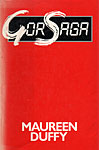 1981, When Norman Forrester of the Defence Ministry’s experimental institute effects a successful fertilisation of a female gorilla a with human semen, the infant that is born, Gordon, known as Gor, is his son in two senses. But Gor’s parentage remains a secret. In Forester’s Britain he has no legal existence as an individual because his existence has never been divulged to the government data bank. In two sense Gor is ‘non-person’.
1981, When Norman Forrester of the Defence Ministry’s experimental institute effects a successful fertilisation of a female gorilla a with human semen, the infant that is born, Gordon, known as Gor, is his son in two senses. But Gor’s parentage remains a secret. In Forester’s Britain he has no legal existence as an individual because his existence has never been divulged to the government data bank. In two sense Gor is ‘non-person’.
Operated on so that he is capable of speech, Gor grows through boyhood and adolescence into a strong, intelligent youth. when he discovers his true identity, he is desolated by his outcast destiny, but ultimately finds a home amongst some of the exiles from a computer-dominated class-oriented society.
Maureen Duffs’s novel offers both an enthralling, fast-moving narrative and a vivid parable of the individual’s struggle to win acceptance from his fellows and to overcome the forces that seek to destroy human individuality in any age.
Londoners (1983)
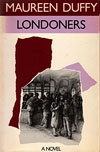 Many of the Londoners in this novel are outcasts — some are criminals in society’s eyes. Most are descended from adventurers and immigrants. The worlds they inhabit — the bedsitter; the cruisers’ pub — lie cheek by howl with the worlds of the affluent and successful — the smart restaurant, the House of Commons Committee room.
Many of the Londoners in this novel are outcasts — some are criminals in society’s eyes. Most are descended from adventurers and immigrants. The worlds they inhabit — the bedsitter; the cruisers’ pub — lie cheek by howl with the worlds of the affluent and successful — the smart restaurant, the House of Commons Committee room.
Al, the narrator, is a Londoner born and bred, a writer living in a small room in West London. Most of other residents in the cavernous Victorian house —and the friends and acquaintances Al meets in tow local pubs, the bohemian and relaxed crowd at the Nevern and the slightly more ambiguous and dangerous crowd at the Knacker’s are Londoners by adoption, some temporary exiles, some permanent.
Change (1987)
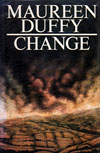 ‘it was one of ours; it was one of theirs. She lay on her back in a prickle of grass and heat with the sun dazzle pouring into her near closed lids and soaking through in a hot bloody flux that dazed and dissolved her as she followed the faint cross drawn high up on the stretched blue silk marquee of the sky...'’
‘it was one of ours; it was one of theirs. She lay on her back in a prickle of grass and heat with the sun dazzle pouring into her near closed lids and soaking through in a hot bloody flux that dazed and dissolved her as she followed the faint cross drawn high up on the stretched blue silk marquee of the sky...'’
hisi poetry to the challenges of new experience. To Daphne it meant separation from her army officer husband and making a new life for herself as an ambulance driver in the Blitz. To Karol it meant putting behind him a whole previous life in Poland and learning to be an officer fighting alongside strangers in the Royal navy.
Illuminations (1991)
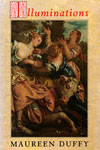 Hetty Dearden has taken early retirement after an unhappy affair with the male head of the histroy department at the college at which she lectured. She is asked to attend a conference in German, where the subject is to be Europe: Past and Present. Whilst researching, she comes across an intriguing letter from an eight-century nun, Tetta, who had also mde her way to Germany — in her case, in search of her aunt who had disappeared some ten years before, and to tkae up her new position as the head of a religious foundation in the untamed Europe of Charlemagne. There, she has immense influence not only within her own church and order but also at court.
Hetty Dearden has taken early retirement after an unhappy affair with the male head of the histroy department at the college at which she lectured. She is asked to attend a conference in German, where the subject is to be Europe: Past and Present. Whilst researching, she comes across an intriguing letter from an eight-century nun, Tetta, who had also mde her way to Germany — in her case, in search of her aunt who had disappeared some ten years before, and to tkae up her new position as the head of a religious foundation in the untamed Europe of Charlemagne. There, she has immense influence not only within her own church and order but also at court.
Hetty is drawn into a love affair with a yound German woman and, in her turn, is thus brought closer to the frightening underworld of political dissent in a Europe which has only recently begun to reject the codes and systems of the Cold War. Hetty’s adventures develop in parellel to those of her predessor, and past and present intertwine, throwing light upon each other. Themes range from female sexuality to politics, power and religion while the idea of Europe itself is woeven into the dual plot.
Occam’s Razor (1993)
 ‘ William of Occam was an Englishman who said you should strip everything away to get at the simple anser and that’d be the right one.’ So Orazio Carbone, the Italian, explains to Pearse Noonan, the Irishman, as the two old men plan a way out of their terrifying difficulties.
‘ William of Occam was an Englishman who said you should strip everything away to get at the simple anser and that’d be the right one.’ So Orazio Carbone, the Italian, explains to Pearse Noonan, the Irishman, as the two old men plan a way out of their terrifying difficulties.
Occam’s Razor is about their frienship, which began at a Catholic Social Club meeting and continue through weekly chess games. The two old men have shared experieces: both are widowers with a beloved child; both are immigrants in London; both have vivid memories of their youth between the Wars.
And, now, both are threatened.
This is a story of self-discovery and moral doubt, of families and roots. It is also a thriller, carried by a compelling plot.
Restitution (1998)
 Short review by Trevor Lewis in The Sunday Times Books, 11th. April, 1999, page 14. ‘Identity, heritage, memories, love and the past: these are the things that time steals away in Duffy’s novel, restoring them — or at least some of them — 50 years on. Betony Falk, a young woman looking for clues about her dead father, gets no help from the grandmother who shares her name. It comes instead from her new flatmate Gill, a gay black dancer whose own life is obliquely connected to hers, just as hers is entwined with that of a nonagenarian Berlin widower, Anton Falk: ties of lies, blood, guilt and sympathy. Carefully, if a little over-conveniently plotted, the novel has a thoughtful mien and strong emotional reserves to sustain it.’
Short review by Trevor Lewis in The Sunday Times Books, 11th. April, 1999, page 14. ‘Identity, heritage, memories, love and the past: these are the things that time steals away in Duffy’s novel, restoring them — or at least some of them — 50 years on. Betony Falk, a young woman looking for clues about her dead father, gets no help from the grandmother who shares her name. It comes instead from her new flatmate Gill, a gay black dancer whose own life is obliquely connected to hers, just as hers is entwined with that of a nonagenarian Berlin widower, Anton Falk: ties of lies, blood, guilt and sympathy. Carefully, if a little over-conveniently plotted, the novel has a thoughtful mien and strong emotional reserves to sustain it.’
Alchemy (2004)
A compelling mystery which combines rich historical narrative with the story of a woman entangled in a 21st-century witch hunt. Jade Green is a solicitor with her own practice, Lost Causes, that she runs from her London flat. She struggles to keep her business afloat, and supplements her income by delivering for the local Chinese takeaway. Her life changes with a single phonecall. Dr Gilbert has been dismissed from his post teaching the history of science at the University of Wessex. Allegations have been made that he was corrupting the students with satanism; the professor himself suspects the university to be controlled by a fundamentalist Christian sect.
As Jade delves into this bizarre case, she finds herself drawn into a 17th-century manuscript, the original of which has been stolen from the Professor's briefcase at the university. It is The Memorial of Amyntas Boston, a young woman — raised as a boy — who is awaiting trial for dabbling in the black arts and in alchemy. Taken into service by Mary Sidney, she had fallen in love with her mistress and ultimately found herself betrayed by her.
The two stories intertwine as Jade feels her life mysteriously resonate with Amyntas’s; her hidden identities and her secret love. In this sweeping novel, Maureen Duffy combines the pleasures of detection with the mysteries of fraud, alchemy, early science and witchcraft. By turns passionate and drily witty, this is a compelling tale of love and labours lost and rediscovered.
Jump to top